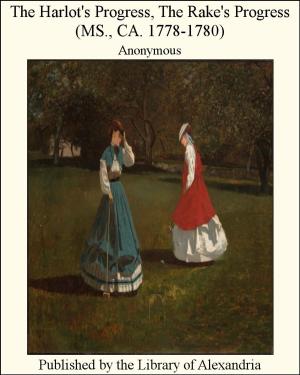The Fate: A Tale of Stirring Times
Nonfiction, Religion & Spirituality, New Age, History, Fiction & Literature| Author: | George Payne Rainsford James | ISBN: | 9781465607607 |
| Publisher: | Library of Alexandria | Publication: | March 8, 2015 |
| Imprint: | Language: | English |
| Author: | George Payne Rainsford James |
| ISBN: | 9781465607607 |
| Publisher: | Library of Alexandria |
| Publication: | March 8, 2015 |
| Imprint: | |
| Language: | English |
There is no mistake more common among historians, no mistake more mischievous, than to take for granted, without deduction, all the statements of the satirists and splenetics of past-by ages as to the manners and customs of their own times, and of the people with whom they mingled. There are half a dozen, at least, of the pleasant little passions of human nature which lead men, especially men of letters, to decry their companions, their friends, and their neighbors--nay, even their countrymen and their country. To say nothing of "envy, hatred, malice, and all uncharitableness"--sins common enough to be wisely prayed against--pride, vanity, and levity point the pen, direct the words, or furnish forth a little drop of gall to every man who is giving an account of the times in which he lives and the country in which he dwells, for those who are living or to live at a distance of space or time from himself. It is pleasant to place our own brightness on a dark back-ground; and the all but universal propensity of mankind to caricature derives an extraordinary zest in its exercise, when, by rendering others around us contemptible or odious, we can bring out our own characters in bolder relief. But there are other, perhaps even meaner motives still, which induce men frequently to portray their own times in broad and distorted sketches. The faculty of admiration is a very rare one; the faculty of just appreciation a rarer one still; but every one loves to laugh; every one feels himself elevated by the contemplation of absurdities in others. There is a vain fondness for the grotesque lurking in the bosoms of most men; and a consciousness that sly or even gross satire, and delicate or coarse caricature, are the best means of giving pleasure to the great mass of mankind, is probably one reason why we find such depreciatory exaggeration in the writings of all those who have given pictures of their own times. The letters of Petrarch, the statements of Hollingshed, the pictures of Hogarth, the romances of Smollett and Fielding, all furnish, it is true, certain sketches of their own times from which we can derive some valuable information, but so distorted by passion, by prejudice, by a satirical spirit, or a love of the ridiculous, that the portrait can be no more relied upon, in its details, than Bunbury's caricature of a Cantab for the general appearance of Cambridge scholars. To give such pictures is mischievous in itself; but I can not help thinking that for an historian to follow them without allowance is more mischievous still. If there be a deviation on either side--though any deviation should be avoided, if possible--surely it would be better for every moral object to paint the past more bright rather than more foul, as the past alone contains the just objects of imitation, though we may emulate contemporary virtue or aspire to ideal perfection in the future.
There is no mistake more common among historians, no mistake more mischievous, than to take for granted, without deduction, all the statements of the satirists and splenetics of past-by ages as to the manners and customs of their own times, and of the people with whom they mingled. There are half a dozen, at least, of the pleasant little passions of human nature which lead men, especially men of letters, to decry their companions, their friends, and their neighbors--nay, even their countrymen and their country. To say nothing of "envy, hatred, malice, and all uncharitableness"--sins common enough to be wisely prayed against--pride, vanity, and levity point the pen, direct the words, or furnish forth a little drop of gall to every man who is giving an account of the times in which he lives and the country in which he dwells, for those who are living or to live at a distance of space or time from himself. It is pleasant to place our own brightness on a dark back-ground; and the all but universal propensity of mankind to caricature derives an extraordinary zest in its exercise, when, by rendering others around us contemptible or odious, we can bring out our own characters in bolder relief. But there are other, perhaps even meaner motives still, which induce men frequently to portray their own times in broad and distorted sketches. The faculty of admiration is a very rare one; the faculty of just appreciation a rarer one still; but every one loves to laugh; every one feels himself elevated by the contemplation of absurdities in others. There is a vain fondness for the grotesque lurking in the bosoms of most men; and a consciousness that sly or even gross satire, and delicate or coarse caricature, are the best means of giving pleasure to the great mass of mankind, is probably one reason why we find such depreciatory exaggeration in the writings of all those who have given pictures of their own times. The letters of Petrarch, the statements of Hollingshed, the pictures of Hogarth, the romances of Smollett and Fielding, all furnish, it is true, certain sketches of their own times from which we can derive some valuable information, but so distorted by passion, by prejudice, by a satirical spirit, or a love of the ridiculous, that the portrait can be no more relied upon, in its details, than Bunbury's caricature of a Cantab for the general appearance of Cambridge scholars. To give such pictures is mischievous in itself; but I can not help thinking that for an historian to follow them without allowance is more mischievous still. If there be a deviation on either side--though any deviation should be avoided, if possible--surely it would be better for every moral object to paint the past more bright rather than more foul, as the past alone contains the just objects of imitation, though we may emulate contemporary virtue or aspire to ideal perfection in the future.















